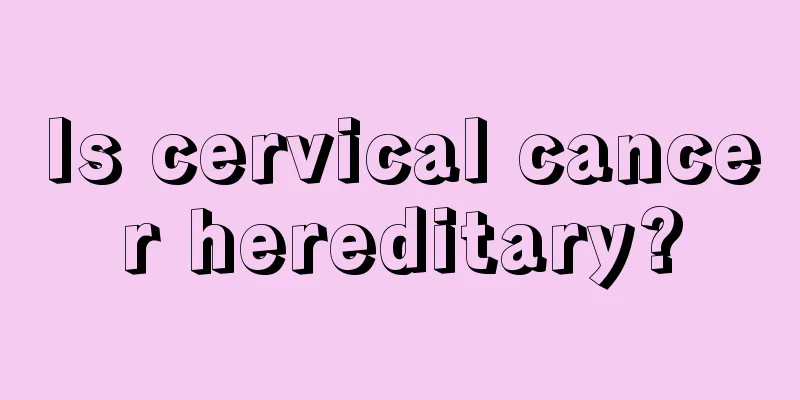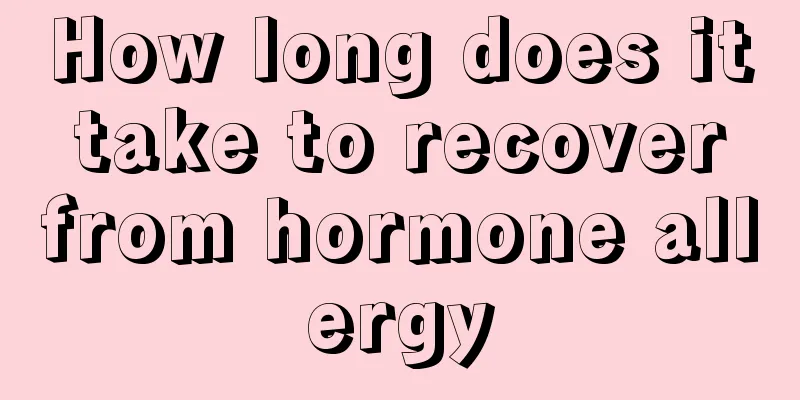Is cervical cancer hereditary?

|
Will cervical cancer be inherited? Cervical cancer is a malignant tumor in gynecological diseases. In recent years, its incidence has tended to be younger. It is one of the common tumors in clinical practice. There are many causes of this disease in life. Everyone should learn more about it and do a good job of disease prevention. Many people worry that cervical cancer will be inherited by their offspring. So, will cervical cancer be inherited? The cause of cervical cancer is HPV infection. Cervical cancer has no inherited material basis, and the human body cannot pass on this foreign virus to the next generation. However, clinical observations have found that although cervical cancer is not inherited, it has a clear family clustering phenomenon. If someone in the family has cervical cancer, the probability of other female members suffering from cancer is relatively increased. This may be related to the same living environment, lifestyle, physical constitution, etc. For women, it is important to develop good living habits, including keeping the vulva and vagina clean, having moderate sex, having a fixed sexual partner, and minimizing the number of abortions. It is important to advocate late marriage and fewer and better births. Delaying the age of starting sexual life and reducing the number of births can reduce the chance of cervical cancer. Married women or women with a history of sexual activity should undergo regular cervical cancer screening. 90%-95% of early cervical cancers can be detected through a cervical cell smear test. If financial conditions permit, HPV testing can also be performed. After having sexual activity, you should have a checkup once a year to prevent it before it happens. Some experts say that cervical cancer vaccination can prevent the occurrence of most cervical cancers, but it cannot provide 100% protection. If you have already been infected with the HPV type included in the vaccine, re-vaccination is equivalent to closing the fold after the sheep have been sheeped, and the significance is limited. The World Health Organization believes that the age of people who can be protected by the vaccine is 9-26 years old, and the most suitable age for vaccination is 11-12 years old, or before having sexual intercourse. |
<<: Is nasopharyngeal carcinoma contagious?
>>: What kind of disease is osteosarcoma
Recommend
Can adults drink breast milk?
Breast milk is the only food that a newborn baby ...
Is it good to brush your teeth with salt for a long time?
Everyone knows that brushing teeth with salt wate...
How effective is breast enhancement underwear?
Underwear has a great effect on the breasts, and ...
The most effective way to treat premature ejaculation
During sexual life, the rhythms of men and women ...
What ointment should I apply after being bitten by a midge
If you are bitten by midges in your life, it is e...
The treatment of early colon cancer should combine biological cell immunotherapy with traditional therapy
The treatment of early colon cancer should combin...
What is the correspondence between the spinal cord and the vertebrae?
The human spinal cord is a relatively sensitive a...
Is lung tumor lung cancer?
Patient Ms. Zhang was diagnosed with early-stage ...
Tea cake shelf life
I believe that many people like to drink Pu'e...
What are the effects of applying tea on the face
Applying tea on the face can clear the dead skin ...
What are the symptoms of acute myocardial infarction?
Acute myocardial infarction is a particularly har...
What should I do if my teeth ache due to hot or cold weather?
In our daily life, we may suddenly find that our ...
Precautions for nursing care of vomiting blood in late stage of liver cancer
Liver cancer is a common disease. In the early st...
What are you missing for hair loss? These foods are essential
Hair loss may be caused by excessive mental stres...
A brief analysis of the common side effects of chemotherapy for bladder cancer
As a common method of treating bladder cancer, ch...









